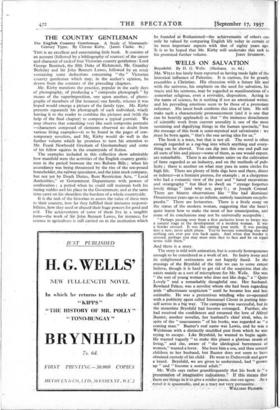THE COUNTRY GENTLEMAN
The English Country Gentleman. A Study of Nineteenth- Century Types. By Chester Kirby. (James Clarke. 6s.)
THIS is an excellent and entertaining little book. It consists of an account (followed by a bibliography of sources) of the career and character of each of four Victorian country gentlemen : Lord George Bentinck, the fifth Duke of Richmond, Mr. Grantley .Berkeley and Sir John Bennett Lawes, followed by an essay containing some deductions concerning " the " Victorian country gentleman which may, in the author's opinion, be drawn from the contents of the preceding chapters.
Mr. Kirby mentions the practice, popular in the early days of photography, of producing a " composite photograph " by means of the superimposition, one upon another, of photo- graphs of members of (for instance) one family, whence it was hoped would emerge a picture of the family type. Mr. Kirby presents separately his photograph of each individual, wisely leaving it to the reader to combine the pictures and (with the help of the final chapter) to compose a typical portrait. We may observe that something very like such composite portraits —characters composed of elements observed no doubt from various living examples—is to be found in the pages of con- temporary novelists, and Mr, Kirby would do well in the further volume which he promises to turn his attention to 'Mr. Frank Newbould Gresham of Greshamsbury and some of his fellow squires in the countryside of fiction.
The examples included in this collection show admirably :how manifold were the activities of the English country gentle- man in the period between the two Reform Bills ; when his ascendancy was being threatened by the rise of the ten-pound householder, the railway speculator, and the joint stock company, but not yet by Death Duties, Rent Restriction Acts, " Local Authorities," or Government Departments with powers of confiscation ; a period when he could still maintain both his "racing stables and his place in the Government, and at the same time carry on his shoulders the burdens of a whole countryside.
It is the task of the historian to assess the value of these men to their country, how far they fulfilled their immense responsi- bilities, how they used or abused their huge powers for good and evil. The achievements of some of them live in a tangible form—the Work of Sir John Bennett LaWes, for instance, for science in agriculture is still carried on in the institution which
he founded at RCithamsted—the achievements of others can only be valued by comparing English life today in certain of its most important aspects with that of eighty years ago. It is to be hoped that Mr. Kirby will undertake this task in










































 Previous page
Previous page